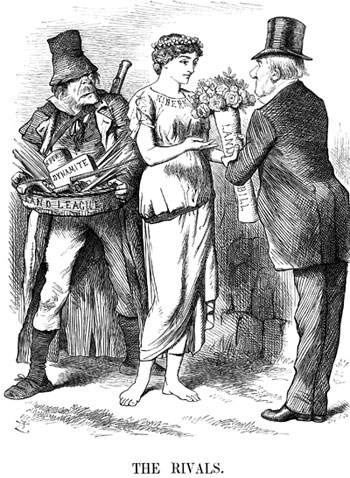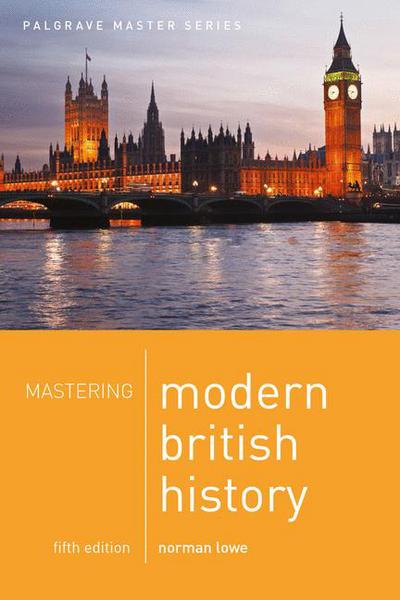


Are you sure you want to reset the form?
Your mail has been sent successfully
Are you sure you want to remove the alert?
Your session is about to expire! You will be signed out in
Do you wish to stay signed in?
Irish Home Rule
Study Sources A to E and then answer the questions that follow.
Source A: Cartoon by Sir John Tenniel which appeared in Punch at the time of Gladstone’s Second Irish Land Act in 1881. The figures represent from left to right: Parnell’s Land League, Ireland, and Gladstone.

Source: Punch, 1881.
Source B:
| Speech by Charles Stewart Parnell in Cork, 21 January 1885. We shall never gain anything from England unless we tread on her toes; we will never gain a single sixpennyworth from her by conciliation... In 1880 I pledged myself that I should form one of an independent Irish party to act in opposition to every English government which refused to concede the just rights of Ireland (applause)... Every Irish politician must be forcibly driven back to the question of national self-government for Ireland (hear, hear). I do not know how this great question will be eventually settled... but we cannot ask for less than the restitution of the parliament which was stolen from us at the end of the last century (loud cheers). Source: quoted in L. Evans & P. J. Pledger (eds.), Contemporary Sources and Opinions in Modern British History, Vol 2, Warne, 1967. |
Source C:
| Speech by Gladstone in the House of Commons during the debate on the First Irish Home Rule Bill, 8 April 1886. Our ineffective coercion is morally worn out... Something must be done, something is demanded from us to restore to Ireland the first conditions of civilised life - the free course of law, the liberty of every individual in the exercise of every legal right, the confidence of the people in the law... The principle I am laying down is not just for Ireland... years ago England tried to pass good laws for the Colonies; but the Colonies said – ‘We do not want your good laws; we want our own’. We admitted the reasonableness of that principle. We have to consider whether it is applicable to Ireland. We stand face to face with what is termed Irish nationality, which demands complete self-government in Irish affairs. Is this an evil in itself? Is this a thing which we should view with horror? Sir, I believe that it is not. Source: Hansard, Parliamentary Debates, 8 April 1886. |
Source D:
| Extract from a book by A. V. Dicey, an opponent of Home Rule. Englishmen will find to their disappointment that they have not achieved the object which from an English point of view was the principle inducement to grant Home Rule to the Irish people, that is, freedom from the difficulty of governing Ireland. Home Rule is not separation, and nothing short of Irish independence would greatly lessen English responsibility... Britain remains responsible for the maintenance of peace and order. Home Rule cannot remove the causes of Irish discontent. It cannot tempt capital towards Ireland, but it may easily drive capital away. It cannot diminish poverty; it cannot soften religious bigotry; it cannot of itself remove agrarian discontent. Source: A. V. Dicey, England’s Case against Home Rule, John Murray, 1886. |
Source E:
| Extract from a book by J. Tyndall published in 1887 In relation to Ireland, Mr Gladstone has proved an evil-doer. The predicted friendship between England and Ireland is pure moonshine. Give her Mr Gladstone’s Home Rule and disloyal Ireland will hit befooled England with redoubled strength and bitterness. She will work for complete separation, and will win it. The hatred which has been nursed so long has only been intensified by untimely concession.... On the other hand an empire still manned by Britons will not die without a fight... Mr Gladstone is a calamity to Britain. What has converted him into a traitor to his country? Mainly of course, the unsteadiness of his own character. Source: J. Tyndall, Perverted Politics, Blackwood, 1887. |
